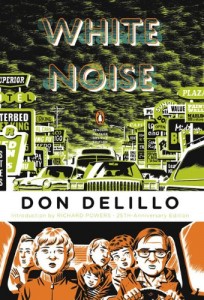White Noise
¶ by Rob Friesel
I recall a conversation that I had with one of my college writing professors; this was during one of the periods when I was writing one of my ill-fated for-credit novels. 1 We were talking about characters, character development, and (more specifically) about how you as the author can attempt to engage the reader through those characters, and thus why it becomes important for your characters to develop–to have an arc–to experience conflicts, and to struggle against those conflicts, and to change and to grow. A neat and tidy little plot is nothing without characters moving in that plot. Of course, given that this is also a conversation being had by two guys acutely aware of post-modernism 2, that conversation inevitably led to a discussion of how characters–particularly narrators–especially first-person narrators–effectively control the tone of the story, not to mention its permeability (i.e., what the reader can access within the narrative 3 ) which really only further smokes up the narrative room (if you know what I mean).
You (the author) made some choices about what the narrator does/not know and/or does/not reveal and/or how those facts and/or perceptions are (or are not) relayed and/or experienced; and you (the reader) knows that he (the author) did that and as such, are suspicious of his entire narrative; and as such, you (the astute reader) are evaluating his (the author’s) craft with that bit of arm’s-length skepticism, cautious of how he might be trying to manipulate your perceptions of given symbols and signs throughout the text and then how those given symbols/signs morph as the narrator’s (and/or other characters) develop and progress through that narrative.
It all gets very messy and convoluted.
But what the hell does this have to do with White Noise?
Easy: I found myself replaying that conversation. Not because I felt like DeLillo was deftly manipulating us with Gladney–whom (if anything) I found a remarkably flat and static persona–but because I felt like DeLillo was deftly manipulating us by brokering those expectations that Gladney would have some kind of dynamic arc. Granted, there’s a case to be made for Gladney-as-normal traveling along an arc that passes through “The Airborne Toxic Event” and comes out on the other side as Gladney-as-unhinged-and/or-at-least-coming-unhinged; but it didn’t read that way to me.
But it wasn’t even Gladney’s lack-of-arc. It was something else. Something… insidious?
The thing about White Noise for me was that it wasn’t what I expected; and then after I accepted that, it still wasn’t… coherent. Somewhere in my mind, before cracking the covers, I’m thinking that this book is dark 4 –there is (after all) something foreboding about that title. So after about forty pages, I’m thinking: OK this is some sort of academically-slanted predecessor to The Simpsons, right? It’s all tucked in there: the eye-rolling humorous non sequiturs, the twisted and reconstituted aphorisms, the slap-stick, the in-jokes, the flawed Everyman at home in his Everytown… But whereas Groening and his writers have tight and tidy, very concentrated plots, 5 DeLillo’s just… meanders? Vaporizes? It never seems to fully coalesce; it’s its own Airborne Toxic Event–it’s a focal point, and for a moment it brings it all together but it’s… well, it’s toxic.
I close the covers thinking that we had a lot of humorous little snapshots and set pieces, fun little vignettes that are loosely stitched together but don’t quite fully form, and never really all resolve. 6 To me it winds up being a book about an insecure college professor who feels like he’s a fraud and spends a lot of time in supermarkets running into a colleague who likes to smells things.
The commentary on American consumerism? I guess it’s there; but it seems like there’s an element of futureshock missing to really bring it all home.
Thus do I leave you with a summary haiku:
Friend, are you a fraud?
Dèjá vu. Breathe deep. Smell it.
Now: how do you feel?
- Though I cannot recall if it was the first or the second.[↩]
- My professor being kind of a romantic though, I’m going to go out on a limb here and say his “acute awareness” of post-modernism was strictly academic (vs. my “morbidly academic” interest) and these discussions were largely to humor me. And/or to bring me back from certain recursing metaphysical edges.[↩]
- Even given cues like cultural context; and/but that’s a digression that might not be worth having?[↩]
- Not that it isn’t rife with black humor and other bits of dark sentiment.[↩]
- Please spare me the hat-tip irony on that one.[↩]
- And don’t give me that bullshit about how a good post-modern novel leaves some things unresolved. This was not like that.[↩]
Leave a Reply